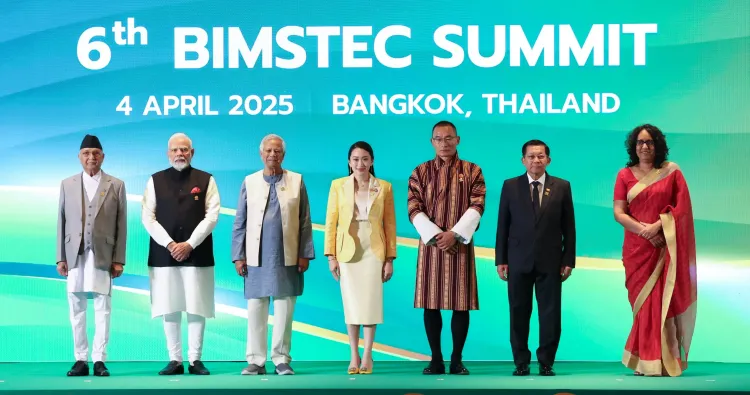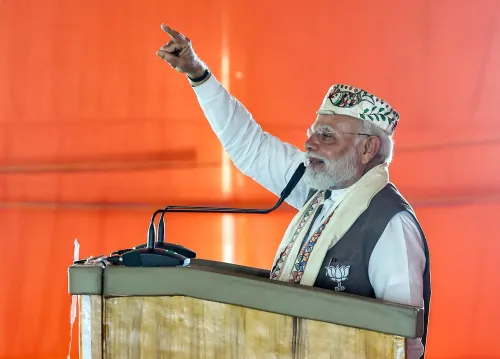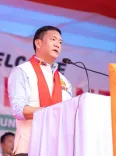PM Modi Introduces a 21-Point Strategy at 6th BIMSTEC Summit

Synopsis
Key Takeaways
- 21-point action plan for BIMSTEC cooperation.
- Focus on economic integration and local currency trade.
- Establishment of a BIMSTEC Centre of Excellence for disaster management.
- Training initiatives for youth and diplomats from BIMSTEC nations.
- Strengthening cultural ties through events like the BIMSTEC Traditional Music Festival.
Bangkok, April 4 (NationPress) Prime Minister Narendra Modi on Friday introduced an extensive 21-point strategy during the sixth BIMSTEC Summit in Bangkok, outlining an ambitious framework for collaboration across various sectors.
His recommendations demonstrate India's leadership in revitalizing BIMSTEC, aligning with the 'Neighbourhood First' and 'Act East' policies, and integrating into India's broader Indo-Pacific vision.
Sharing his vision on X, PM Modi stated, "BIMSTEC is a crucial platform to promote global good. It is essential that we fortify it and enhance our engagement. In this regard, I proposed a 21-point strategy addressing different areas of our collaboration."
Highlighting the necessity for economic integration, PM Modi suggested the formation of a BIMSTEC Chamber of Commerce, an annual BIMSTEC Business Summit, and a feasibility study on conducting trade in local currencies.
"It's time to elevate business across BIMSTEC nations!" he wrote.
Focusing on digital transformation, he urged the group to leverage the capabilities of the IT sector and enhance technological proficiency.
He proposed a pilot study to evaluate the needs of BIMSTEC nations regarding the sharing of India's Digital Public Infrastructure experience, along with the integration of India's UPI with regional payment systems.
Referring to the recent earthquake affecting Myanmar and Thailand, PM Modi underscored the significance of regional collaboration in disaster preparedness and response.
He announced the creation of a BIMSTEC Centre of Excellence for Disaster Management in India and mentioned that India will host the fourth joint disaster management exercise later this year.
He also emphasized the necessity to enhance cooperation in the space and security sectors.
Proposals included hosting the inaugural Home Ministers' meeting in India, training through ground stations, manufacturing and launching nano-satellites, and utilizing remote sensing data for regional planning and development.
In the domain of training and capacity building, PM Modi expressed, "BIMSTEC has the potential to be a shining example of capacity building frameworks. We will all learn from each other and grow!"
He introduced the BODHI initiative (BIMSTEC for Organised Development of Human Resource Infrastructure), under which 300 youths from BIMSTEC nations will receive training annually in India.
Scholarships for BIMSTEC students at the Forest Research Institute and Nalanda University were also announced.
Additionally, India will conduct annual training programs for young diplomats from BIMSTEC countries, and the Tata Memorial Centre will provide training in cancer care.
PM Modi also announced the establishment of a Centre of Excellence for research in traditional medicine and another to facilitate knowledge exchange, research, and capacity building for farmers.
Highlighting energy security and youth involvement, he said, "We will collectively energize BIMSTEC, and it's our youth who will take the lead."
The BIMSTEC Energy Centre in Bengaluru has commenced operations and will train youth in the energy sector. He also called for expedited efforts on electric grid interconnections.
He revealed plans for the BIMSTEC Young Leaders' Summit, a regional hackathon, and a Young Professionals Visitors Programme. India will also host the BIMSTEC Athletics Meet later this year and the first BIMSTEC Games in 2027.
On cultural ties and connectivity, PM Modi remarked, "Few things connect like culture! May cultural linkages bring BIMSTEC even closer."
He proposed hosting the BIMSTEC Traditional Music Festival in India and announced the establishment of a Sustainable Maritime Transport Centre to support research, innovation, and policy coordination in the maritime sector.
While BIMSTEC was officially established in 1997, its strategic direction and momentum notably increased post-2016, when PM Modi invited BIMSTEC leaders for a retreat in Goa alongside the BRICS Summit—an event widely regarded as a turning point for the group.
His foreign policy initiatives—Neighbourhood First, Act East, the MAHASAGAR vision, and a vision for the Indo-Pacific—have infused renewed energy into BIMSTEC, benefiting all member nations.
India's ongoing efforts have fostered BIMSTEC's evolution into a cohesive regional bloc. In 2019, PM Modi invited BIMSTEC leaders to his swearing-in ceremony, reaffirming India's dedication to regional unity.
India has also made significant progress in enhancing connectivity—physical, digital, and energy-based—within the grouping. The BIMSTEC Energy Centre in Bengaluru plays a crucial role in coordinating regional grid interconnection projects under the 'One World, One Sun, One Grid' initiative.
India's leadership in disaster response has also been fundamental to BIMSTEC cooperation. Following the devastating 7.7-magnitude earthquake in Myanmar, India launched Operation Brahma to assist the affected area, reinforcing its position as the first responder.
Under India's guidance, BIMSTEC has evolved into a dynamic and action-oriented platform with the potential to shape the future of regional cooperation and integration.
The 21-point strategy introduced by PM Modi further cements India's pivotal role in steering BIMSTEC towards a shared and sustainable future.









